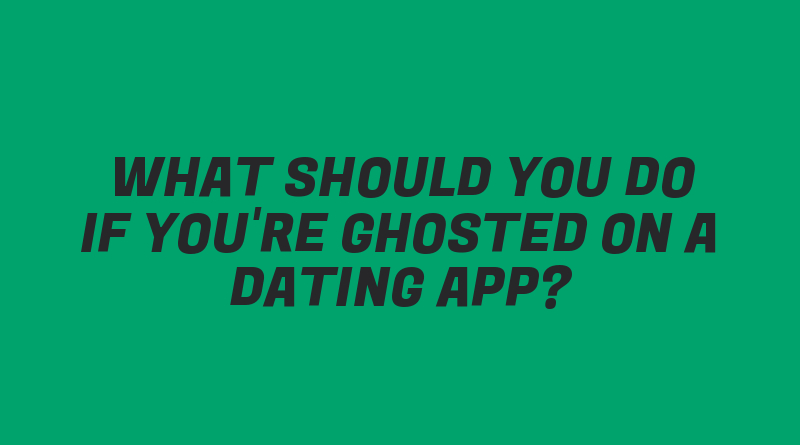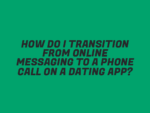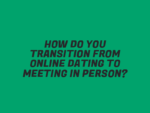What Should You Do If You’re Ghosted on a Dating App?
Ghosting is one of the most frustrating experiences in online dating, where someone you’re communicating with suddenly disappears without explanation. It leaves you confused, hurt, and often questioning what went wrong. While ghosting can feel deeply personal, it’s a common issue in modern dating apps. This article will provide a comprehensive guide on what to do if you’re ghosted, answering the top 10 most common related questions. By understanding the reasons behind ghosting and learning how to handle it effectively, you can move forward with confidence.
What Does It Mean to Be Ghosted on a Dating App?
Ghosting occurs when someone you’ve been communicating with on a dating app suddenly cuts off all contact without any explanation. This can happen at any stage of online dating—whether after a few messages, multiple dates, or even during what seems like a blossoming relationship.
Signs You’ve Been Ghosted:
- Sudden lack of communication: If you were having regular conversations and the person suddenly stops responding for several days or weeks, this is the most common sign of being ghosted.
- No explanation or closure: Ghosting is characterized by a lack of closure. The person who disappears doesn’t provide any explanation, leaving you wondering why they stopped communicating.
- Disappearance from the app: In some cases, the person may deactivate or delete their dating profile, making it impossible to contact them again. However, many people who ghost simply stop responding while keeping their profile active.
Ghosting can feel like a personal rejection, but it’s often more about the other person’s inability to communicate properly than anything you did wrong.
Why Do People Ghost on Dating Apps?
Understanding why people ghost can help you process the experience and realize that it’s rarely about you. There are several reasons someone might ghost another person on a dating app, many of which have nothing to do with the person being ghosted.
Common Reasons for Ghosting:
- Loss of interest: The most common reason for ghosting is that the person simply lost interest. Instead of explaining this, they choose to disappear to avoid an uncomfortable conversation.
- Overwhelm with online dating: Dating apps can be overwhelming, especially for those managing multiple conversations. Some people may feel burned out or stressed by the number of matches and decide to ghost rather than address their feelings.
- Fear of confrontation: Ghosting can feel like an easy way out for people who dislike confrontation. They may feel uncomfortable telling you that they’re not interested or that they’ve met someone else, so they choose silence instead.
- Met someone else: It’s possible the person who ghosted you started seeing someone else and decided to focus on that relationship. Instead of informing you, they simply cut off communication.
- Life distractions: In some cases, personal issues such as work stress, family matters, or health concerns can cause someone to withdraw from dating apps. They might ghost because they’re no longer in a mental or emotional place to continue dating.
While ghosting can feel abrupt and hurtful, it’s often a reflection of the other person’s inability to handle relationships maturely.
Should You Reach Out After Being Ghosted?
When you’re ghosted, it’s natural to want answers or closure. But should you reach out to the person who ghosted you, or is it better to move on?
Things to Consider Before Reaching Out:
- Timing: If it’s only been a few days since they last replied, it’s possible they’re just busy or distracted. In this case, a polite check-in message like “Hey, hope all is well!” might be appropriate. However, if weeks have passed without a response, it’s likely they’ve chosen to ghost you intentionally.
- Context of the relationship: How deep was your connection? If you had only exchanged a few messages or went on one or two casual dates, it may be best to let it go. However, if the relationship seemed more serious, you might feel justified in reaching out for closure.
- What you hope to achieve: Before reaching out, ask yourself what you hope to gain from the conversation. Will contacting them make you feel better, or are you likely to feel worse if they don’t respond? If you’re seeking closure, understand that it might not come from them, and reaching out could lead to further disappointment.
If you do decide to reach out, keep the tone light and non-confrontational. Something like, “Hey, I haven’t heard from you in a while. Just wanted to check in—hope everything’s okay!” gives them the chance to explain without putting pressure on the situation. If they don’t respond, take it as a clear sign to move on.
How Should You Handle Being Ghosted?
Handling ghosting with grace can be difficult, especially when emotions are involved. However, how you respond can make a significant difference in your emotional recovery.
Steps to Handle Ghosting:
- Acknowledge your feelings: It’s okay to feel hurt, confused, or even angry when you’re ghosted. Acknowledge these emotions and give yourself time to process them rather than pushing them aside.
- Don’t take it personally: Ghosting often says more about the person who ghosted you than it does about you. Remind yourself that this behavior reflects their inability to communicate maturely, not your worth as a person.
- Resist the urge to overanalyze: It’s natural to replay conversations in your head and wonder what you did wrong. However, overanalyzing won’t provide the answers you’re looking for. Accept that you may never know why they ghosted, and that’s okay.
- Don’t chase after them: It’s tempting to send multiple messages asking for answers or trying to reconnect, but this often leads to more frustration. If they’ve ghosted you, continuing to reach out likely won’t change the outcome.
- Focus on moving forward: Instead of dwelling on the ghosting, shift your focus to moving forward. Continue engaging with other matches, pursue hobbies you enjoy, and surround yourself with supportive friends or family members.
By handling ghosting with emotional maturity, you can protect your mental health and move on from the experience more quickly.
What Are Healthy Ways to Move On After Being Ghosted?
Moving on from being ghosted can feel challenging, especially if you were invested in the connection. However, there are several healthy strategies that can help you cope and move forward.
Tips for Moving On:
- Accept the reality: The first step to moving on is accepting that the person who ghosted you has chosen not to continue the relationship. While it’s disappointing, accepting the reality of the situation allows you to begin the healing process.
- Engage in self-care: Focus on activities that make you feel good, whether it’s exercising, cooking a nice meal, spending time with loved ones, or practicing mindfulness. Self-care can help shift your focus from the ghosting to your own well-being.
- Reconnect with friends and family: Reach out to the people who make you feel valued and appreciated. Spending time with friends and family can remind you that you’re loved and supported, even if one person on a dating app didn’t see your worth.
- Avoid jumping to conclusions: Ghosting can leave you with many unanswered questions, but try to avoid assuming the worst about yourself. Just because one person ghosted you doesn’t mean you did anything wrong or that you’ll be ghosted again in the future.
- Take a break if needed: If you’re feeling emotionally drained by the experience, consider taking a break from online dating to recharge. Stepping away from dating apps can give you time to focus on yourself and come back with a refreshed mindset.
By prioritizing your emotional health and maintaining a positive outlook, you’ll be able to move on from being ghosted more easily and with greater resilience.
Should You Confront the Person Who Ghosted You?
Many people feel tempted to confront the person who ghosted them to get closure or express their frustration. However, it’s important to weigh the potential outcomes before deciding to confront them.
Considerations Before Confronting:
- What do you hope to achieve?: Ask yourself what you expect to gain from the confrontation. If you’re hoping for an explanation, consider that the person may not provide one, and their response (or lack thereof) could leave you feeling even worse.
- Are they worth your energy?: If someone ghosted you, it’s likely they don’t value clear communication or emotional maturity. Is confronting someone who has shown they don’t care about your feelings worth your time and energy?
- Can you handle no response?: If you confront the person and they don’t respond, it could lead to more hurt and frustration. Be prepared for the possibility that they may ignore your message entirely.
- Will it help you move on?: For some people, confrontation feels like a way to reclaim power and move on. If you think confronting the person will give you the closure you need, do so respectfully and without anger.
In most cases, confronting someone who ghosted you won’t lead to the resolution you’re hoping for. It’s often more productive to focus on healing and moving forward without seeking closure from the person who ghosted you.
How Can You Prevent Being Ghosted in the Future?
While you can’t control someone else’s behavior, there are steps you can take to reduce the likelihood of being ghosted in future dating experiences.
Ways to Reduce the Likelihood of Ghosting:
- Set clear expectations early on: When you begin talking to someone, set the expectation that you value open and honest communication. Let them know that you prefer directness over disappearing, even if they’re no longer interested.
- Pace the relationship: Jumping into an emotional connection too quickly can sometimes overwhelm the other person, leading to ghosting. Take your time getting to know each other and allow the relationship to develop naturally.
- Look for signs of commitment: Before investing heavily in someone, pay attention to whether they show signs of commitment. Are they consistent in their communication? Do they seem genuinely interested in getting to know you, or are they more casual in their approach?
- Focus on mutual interest: If you’re investing more effort and emotion into the relationship than the other person, it could be a sign that the connection isn’t balanced. Ghosting is more likely to happen when one person is significantly less invested than the other.
- Pay attention to red flags: If the person shows signs of flakiness or inconsistency early on, it’s a potential red flag that they may ghost later. Trust your instincts, and don’t be afraid to end things if you sense they’re not fully committed.
While it’s impossible to prevent ghosting entirely, being mindful of these tips can help create healthier and more honest dating experiences in the future.
Is It Ever Okay to Ghost Someone?
The question of whether ghosting is ever acceptable comes up frequently. While most experts agree that communication is key to respectful dating, there may be rare circumstances where ghosting feels like the only option.
Situations Where Ghosting Might Be Acceptable:
- Feeling unsafe: If someone makes you feel unsafe or uncomfortable, ghosting may be the safest way to disengage from the situation. Your safety and well-being should always come first.
- Abusive or manipulative behavior: If the person is showing signs of manipulation, controlling behavior, or emotional abuse, cutting off contact without explanation may be the best way to protect yourself.
- Very early in communication: If you’ve only exchanged a few messages and don’t feel a strong connection, some people may choose to ghost rather than send a formal rejection. However, it’s still generally better to send a brief message explaining your lack of interest.
Even in situations where ghosting feels justified, open and honest communication is almost always the better option. A simple message like, “I don’t think we’re a good match, but I wish you the best,” can go a long way in fostering respectful dating habits.
How Can You Cope with the Emotional Impact of Ghosting?
Ghosting can take a toll on your emotional well-being, especially if you were excited about the potential connection. Coping with the emotional impact of ghosting requires self-compassion and a focus on healing.
Emotional Coping Strategies:
- Acknowledge your feelings: Don’t dismiss or minimize your feelings. If you’re hurt or upset, give yourself permission to feel those emotions. Ghosting can feel like a form of rejection, and it’s okay to grieve the lost connection.
- Talk to someone you trust: Sharing your experience with a friend, family member, or therapist can help you process your emotions. Sometimes, simply talking it out can provide clarity and comfort.
- Practice self-compassion: Be kind to yourself during this time. Remind yourself that being ghosted isn’t a reflection of your worth. The other person’s inability to communicate says more about them than it does about you.
- Engage in activities that bring you joy: Distract yourself from the pain of ghosting by engaging in activities that make you happy, whether that’s exercising, reading, spending time outdoors, or pursuing a creative hobby.
- Take a break from dating if needed: If you’re feeling emotionally drained, it’s okay to take a break from online dating. Give yourself time to heal before jumping back into the dating scene.
By addressing the emotional impact of ghosting in a healthy way, you can regain your confidence and move forward with greater resilience.
What Can You Learn from Being Ghosted?
While ghosting is painful, it can also offer valuable lessons about dating and relationships. Reflecting on the experience can help you grow and approach future connections with more awareness and self-assurance.
Lessons to Take from Ghosting:
- You deserve clear communication: Ghosting is a reminder that you deserve someone who is willing to communicate openly and honestly. Don’t settle for someone who can’t offer basic respect and communication.
- Not every connection is meant to last: Sometimes, people drift apart or realize they’re not compatible. Ghosting, while hurtful, can be a sign that the connection wasn’t meant to last, and that’s okay.
- You can’t control others’ actions: Ghosting teaches you that you can’t control how others behave. However, you can control your reaction and how you move forward.
- Emotional resilience is key: Dating requires resilience. Not every interaction will end in a relationship, and rejection (whether direct or through ghosting) is part of the process. Each experience makes you more emotionally resilient and better prepared for future relationships.
By learning from the experience and applying these lessons, you can approach future dating situations with more confidence and emotional strength.
Being ghosted on a dating app is a difficult and frustrating experience, but it doesn’t have to define your dating journey. By understanding why ghosting happens, handling it with emotional maturity, and focusing on self-care, you can move on from ghosting with resilience. Remember, ghosting is often more about the other person’s inability to communicate than it is about your worth. Stay true to your values, and keep searching for connections with people who respect you and communicate openly. With these tools, you’ll be well-prepared to navigate the online dating world, even when faced with the occasional ghosting.











